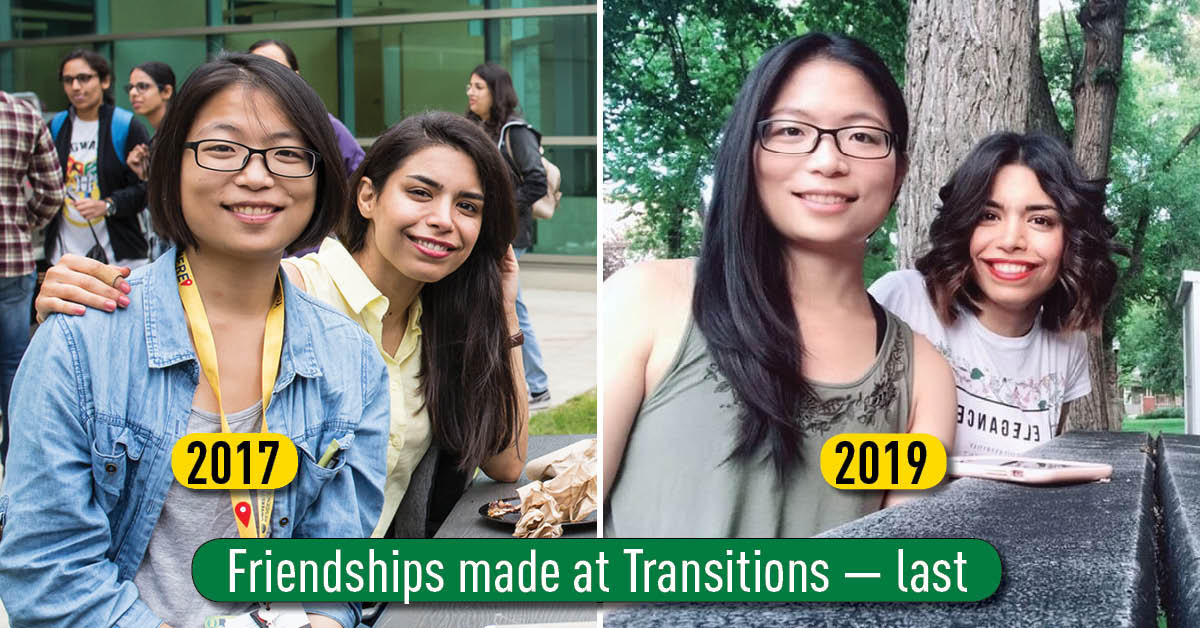
During the first year studying at UAlberta, Reyhaneh Alizadeh Rabiei thought she would be spending her birthday alone. She found herself often isolated and missing Tabriz, Iran, where her family still lives. It was an unlikely friend - made in a seemingly unlikely place - who helped her adapt to Canada.
"I was talking about being from Iran, and all of a sudden I hear this girl saying she loves Iranian culture and she wanted to learn about my country," says Rabiei. The girl she met was Kai-Erh Kao who had just arrived from Taiwan. The two met at the Transitions Orientation for new international students at UAlberta. "[Kao] was the only person to call me on my birthday and we ended up spending the whole day together."
Rabiei isn't alone in finding long-lasting friendships through onboarding or orientation programs. Transitions is specifically designed for undergraduate and graduate international students to not only get to know the UAlberta campus but also meet their classmates from across the globe and learn how to adapt to living in Edmonton, from how classroom participation works to what to expect from the weather.
Kumarie Achaibar-Morrison, Associate Director of International Student Services, explains that the orientation process is critical for student success. Transitions is only one part of the larger suite of orientation programs offered on campus, but it plays one of the most important parts when it comes to international students, helping international students adapt to life in Edmonton. "Transitions looks to help both the academic and the logistical sides of studying at UAlberta," says Achaibar-Morrison. "By working through the myths and misconceptions that accompany studying abroad, students newly landed in Canada can better adapt to the climate and culture of the area, leading to better academic outcomes."
Currently, approximately 80 per cent of international students, or around 1,400 individuals each year, take part in Transitions, with about 67 per cent participating in multiple parts of the orientation process. A large number of students who took part in Transitions now volunteer with the program. Gavin Palmer, Student Engagement Programs Coordinator, explains that his volunteers want to give back to Transitions because of how much the program helped them.
"Our volunteers contribute well over 1,800 hours annually to help other students with their orientation," says Palmer. He points out that the transition to a new normal for international students is made substantially easier through peer-to-peer interaction. "I see new students from all cultures building a community and any connection between students is always a win."
Rabiei and Kao's friendship was an asset to both their educations. During regular coffee or lunch meetups, the two developed their English language skills, ensuring they had the verbal skills for their careers after their degrees. For Rabiei, she knows it would have been easy for her to find a group of fellow students from the same culture and speaking the same language. Meeting Kao meant Rabiei started to feel at home in her new surroundings.
"Not only was she my first English speaking friend, but she was also my first international friend," says Rabiei, who goes on to point out that even though their careers are seeing them both much busier in life, the two are still friends today and still make time for coffee and catching up. "[Kao] is much more outgoing than I am. She pushed me in many different ways. I don't think I would have pushed myself without her help."
At UAlberta, students are encouraged to think about their careers as early as possible, sometimes even within the first few weeks of their courses. For international students, it becomes especially important to know where their career is headed and whether that career will remain in Alberta. Transitions helps students figure out whether their stay in Canada will be just for the degree or for the rest of their lives.
It wasn't easy for Rabiei, but she found a new home in Edmonton. She knows first-hand why Transitions was so important for her to orient not only to her new school, but to her new city. Rabiei and Kao both graduated with their master's degrees from UAlberta; in fact, they graduated the exact same day.
"We didn't realize at first we were graduating the same day, but it was perfect and like both of our programs knew we were best friends," exclaims Rabiei. "The whole experience of studying with UAlberta was a lot more fun with [Kao] and the rest of the friends I made. I think every student coming to Edmonton for the first time should go through the Transitions program. They'll never have to feel alone."